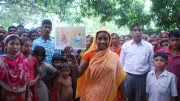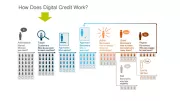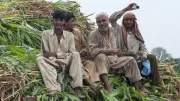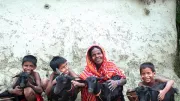Recent Blogs
Blog
Graduation Case Studies: An Opportunity to Learn & Scale Up
To further understand the opportunities and challenges faced by governments in the implementation of a Graduation Approach, the Ford Foundation has commissioned three case studies to examine the planning and execution of Graduation programs launched by the governments of Colombia, Peru and Ethiopia.Blog
Reducing Malnutrition through the Graduation Approach
BRAC’s Targeting the Ultra Poor (TUP) program employs the Graduation Approach, through which participant households receive income-generating assets and training on business development, nutrition and social development. Researchers examined the effects of TUP on nutritional outcomes in Bangladesh, and results have been promising.Blog
An Introductory Course to Digital Credit
In the growing field of digital credit, CGAP research has found exciting innovations along with fundamental miscalculations. CGAP's self-directed course, "An Introduction to Digital Credit," presents key lessons for practitioners, regulators and others with an interest in digital credit.Blog
Unlocking Financial Inclusion Using Biometrically Verified SIMs
In 2015, Pakistan became the first country to leverage biometric SIM verification for remote mobile wallet account opening. We talked to members of the Banking Policy and Regulation Department at the State Bank of Pakistan to learn more about these developments and the exciting implications for financial inclusion.Blog
Agents for Everyone: Removing Agent Exclusivity in Kenya & Uganda
Mobile money and banking agents blend seamlessly into the daily economic lives of consumers in countries like Kenya and Uganda, offering convenience and expanding access points to financial services. But agent exclusivity clauses can limit customers' choices.Blog
The Replication Limits of M-Pesa in Latin America
Is the challenge of replicating the success of the M-Pesa model in Kenya more about implementation and management or about context and market structure? In Latin America and the Caribbean (LAC), the evidence points to context.Blog
Will Crowdfunding Help Financial Inclusion of Unserved Crowds?
“Crowdfunding” is market-based financing where small amounts of funds are raised from large numbers of individual sources. While crowdfunding has the potential to become the next big thing for financial inclusion, risks for both borrowers and lenders need to be better understood.Blog
A Better System for Internal Complaint Handling
As with any product, there are times when financial services do not work as customers expected they would. How can financial service providers improve their internal complaint handling systems?Blog
5 Ways an Emergency Mobile Wallet Can Lead to Financial Inclusion
Cash as aid offers recipients choice and dignity. The digitization of cash transfers can minimize risks of using cash in crisis environments and provide access to financial services that could help the poorest cope with shocks in the future.Blog
User-Centered Financial Services Build Household Resilience
"Resilience" refers to the ability to anticipate, respond to and recover from shocks. Freedom from Hunger used “resilience diaries” with 46 households in Burkina Faso to research whether financial services could play a greater role in building household resilience.Blog
Catalyzing Graduation with Village Savings and Loan Associations
In Haiti, Fonkoze recognized a need for post-graduation support for participants of its Chemen Lavi Miyò (CLM) (Pathway to a Better Life) program. One of the most promising solutions to date is the village savings and loan association (VSLA).Blog
How Ghana Set Its Rules on Interest Payment on e-Money Accounts
Soon, customers in Ghana will earn interest on their mobile money wallets. How did Ghana do it differently than Tanzania, the first country where a mobile money service paid out interest?Blog
Interest Payments on Mobile Wallets: Bank of Tanzania’s Approach
One ongoing debate in digital financial services concerns whether customers should be able to earn interest on mobile money wallets. The Bank of Tanzania decided that the benefit of interest earned by MNOs should go directly to customers. Here are key lessons to date.Blog
Graduation at UNHCR: Protecting the Most Vulnerable Refugees
While the Graduation Approach was initially designed for the extreme poor, UNHCR believes that the model holds strong potential for refugees. How are their innovative adaptations and applications of the Graduation Approach working to build refugee self-reliance?Blog
How India’s New Payments Banks Stack Up
India sparked optimism for greater financial inclusion last year when it created a new category of banking service provider—the payments bank. However, three players already chose to surrender their license approvals. What does the remaining line-up of payments banks look like?Blog
Use of “Emerging Regulatory Enablers” to Promote DFS
In 10 years of research into regulatory issues surrounding digital financial services, CGAP has maintained a relatively consistent stance on the "basic regulatory enablers" necessary for DFS to flourish. CGAP’s Inclusive Markets Team has now started to examine "emerging regulatory enablers" and their role in DFS.Blog
Tugende: Analog Credit on Digital Wheels
In Uganda, Tugende has helped over 3,000 motorcycle taxi drivers on the path to ownership by leveraging new technologies that enable the purchasing of an asset over time. Tugende's success has four key lessons for other digital finance plus initiatives.Blog
Setting the Stage for a Market Systems Approach
A market systems approach to financial inclusion seeks to identify the root causes that prevent low-income people from accessing and using financial services. The program diagnostic process should be designed and implemented through a systems lens.Blog
Graduation into Sustainable Livelihoods: What’s in a Name?
When it comes to graduation programming, the term “graduation” is often misunderstood, which can lead to confusion about the approach. What is the meaning of "graduation," and what does it mean for poverty reduction efforts?Blog




















